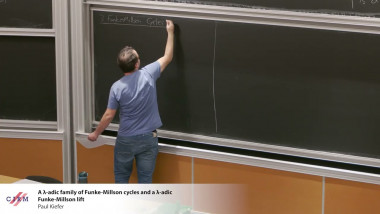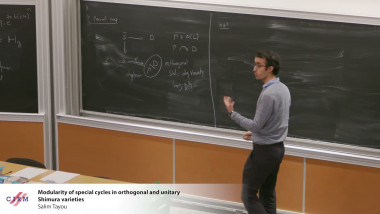
A $\lambda$-adic family of Funke-Millson cycles and a $\lambda$-adic Funke-Millson lift
By Paul Kiefer

Modularity of special cycles in orthogonal and unitary Shimura varieties
By Salim Tayou
Appears in collection : Jean-Morlet Chair 2020 - Conference: Diophantine Problems, Determinism and Randomness / Chaire Jean-Morlet 2020 - Conférence : Problèmes diophantiens, déterminisme et aléatoire
Let $q=p^r$, where $p$ is a prime number and $ ß=(\beta_1 ,\ldots ,\beta_r)$ be a basis of $\mathbb{F}_q$ over $\mathbb{F}_p$. Any $\xi \in \mathbb{F}_q$ has a unique representation $\xi =\sum_{i=1}^r x_i \beta _i$ with $x_1,\ldots ,x_r \in \mathbb{F}_p$. The coefficients $x_1,\ldots ,x_r$ are called the digits of $\xi$ with respect to the basis $ß$. The analog of the Rudin-Shapiro function is $R(\xi)=x_1x_2+\cdots + x_{r-1}x_r$. For $f \in \mathbb{F}_q [X]$, non constant and $c\in\mathbb{F}_p$, we obtain some formulas for the number of solutions in $\mathbb{F}_q$ of $R(f(\xi ))=c$. The proof uses the Hooley-Katz bound for the number of zeros of polynomials in $\mathbb{F}_p$ with several variables.
This is a joint work with László Mérai and Arne Winterhof.
